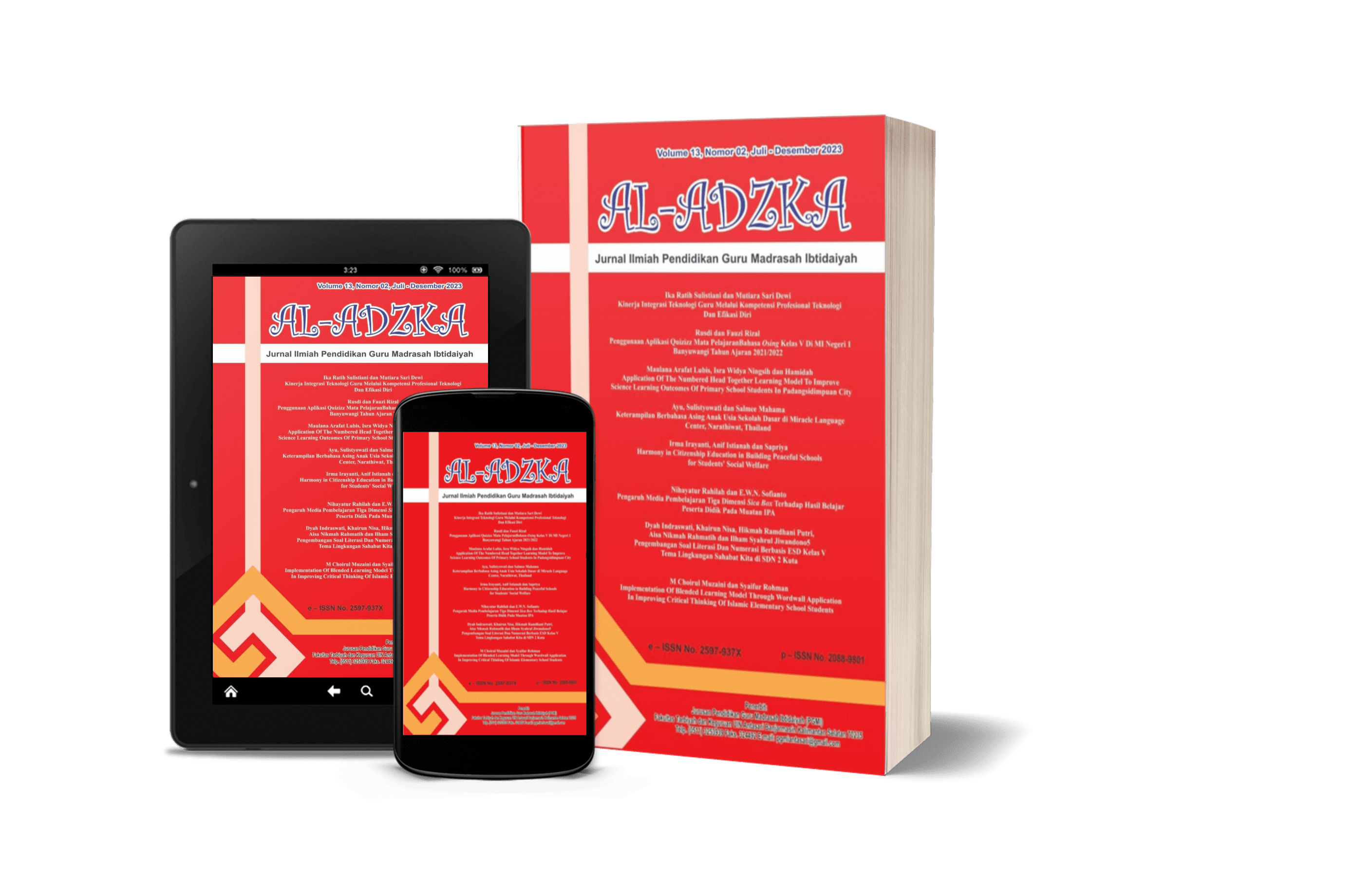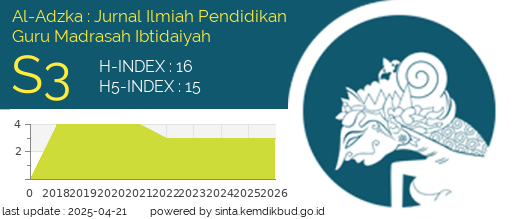Developing a Religion Tolerance-Based Character Education Framework for Elementary School Students
DOI:
https://doi.org/10.18592/aladzkapgmi.v15i1.14540Keywords:
Religion Tolerance, Character, Education Framework, Elementary SchoolAbstract
Character education plays a crucial role in shaping students' moral values, especially in multicultural societies where religious tolerance is essential for social harmony. However, fostering religious tolerance in primary schools remains challenging due to limited structured character education programs. This study aims to explore the implementation of religious tolerance-based character education in elementary schools and identify effective strategies for its reinforcement. This study employs a qualitative descriptive approach, with data collected through observations, interviews, and document analysis at an elementary school with a diverse religious background. The data were analyzed using data reduction, display, and conclusion-drawing techniques to understand the phenomenon comprehensively. The findings indicate that strengthening religious tolerance-based character education is implemented through routine activities, spontaneous interventions, teacher role modeling, and environmental conditioning. Routine activities such as daily handshakes, prayers, English Day, literacy sessions, and religious holiday celebrations foster an inclusive school culture. Teachers play a pivotal role in promoting tolerance through direct interventions and exemplary behavior, while the school environment reinforces tolerance through posters, study group arrangements, and discussion-based learning. This study concludes that integrating religious tolerance into daily school activities and the curriculum effectively instills tolerance values among students. These findings contribute to developing structured programs for character education in primary schools, promoting an inclusive and respectful learning environment.References
Aderibigbe, S. A., Idriz, M., Alzouebi, K., AlOthman, H., Hamdi, W. B., & Companioni, A. A. (2023). Fostering tolerance and respect for diversity through the fundamentals of Islamic education. Religions, 14(2), 212. https://doi.org/10.3390/rel14020212
Ahmadi, A. (2009). Psikologi Sosial. Jakarta : PT Rineka Cipta
Bandura, A. (1977). Social learning theory. Prentice-Hall.
Banks, J. A. (1994). An introduction to multicultural education. Allyn and Bacon.
Edelstein, M. L., Moen, A., Benson, J. L., Smucker, R., & Perkins-Parks, S. (2023). Development and implementation of a function-based clinical interview to evaluate childhood behavior problems. Cognitive and Behavioral Practice, 30(3), 421-435. https://doi.org/10.1016/j.cbpra.2022.01.003
Elsayed, W. (2024). Building a better society: The Vital role of Family's social values in creating a culture of giving in young Children's minds. Heliyon, 10(7). https://doi.org/10.1016/j.heliyon.2024.e29208
Fitrah, M. (2021). Pendidikan karakter berbasis toleransi dalam konteks keindonesiaan. Jurnal Pendidikan dan Kebudayaan, 26(1), 78–87. https://doi.org/10.21831/jpk.v26i1.30678
Goodman-Scott, E., Hays, D. G. & Cholewa, B. E. (2018). “It Takes a Village”: A Case Study of Positive Behavioral Interventions and Supports Implementation in an Exemplary Urban Middle School. The Urban Review 50(1), hal. 97-122. https://doi.org/10.1007/s11256-017-0431-z
Gunawardena, M., & Brown, B. (2021). Fostering Values Through Authentic Storytelling. Australian Journal of Teacher Education, 46(6). https://doi.org/10.14221/ajte.2021v46n6.3
Horenczyk, G., & Tatar, M. (2002). Teachers’ attitudes toward multiculturalism and their perceptions of the school organizational culture. Teaching and Teacher Education, 18(4), 435-445. https://doi.org/10.1016/S0742-051X(02)00008-2
Jayanti, I. T., Cahyo, A. N., Setyaningsih, E. et al. (2022). Penguatan Pendidikan Karakter Religius di TPA (Taman Pendidikan Al-Qur’an) Nurul Yaqin Desa Jagoan. Buletin KKN Pendidikan 4(1), 69 – 79. https://doi.org/10.23917/bkkndik.v4i1.19184
Kemendiknas. (2017). Bahan Pelatihan Penguatan Metodologi Pembelajaran Berdasarkan Nilai-Nilai Budaya untuk Membentuk Daya Saing dan Karakter Bangsa. Jakarta: Kementerian Pendidikan Nasional Badan Penelitian dann Pengembangan Pusat Kurikulum
Koukounaras L. M. (2022). The Socio-Pedagogical Dynamics of Religious Knowledge in Religious Education: A Participatory Action-Research in Greek Secondary Schools on Understanding Diversity. Religions; 13(5):395. https://doi.org/10.3390/rel13050395
Lickona, T. (1991). Educating for character: How our schools can teach respect and responsibility. Bantam Books.
Lisnawati, S. (2016). The Habituation Of Behavior As Students’ Character Reinforcement In Global Era. Jurnal Pendidikan Islam 2(3), hal. 413-428. https://doi.org/10.15575/jpi.v2i3.852
Maulana, A., & Gontar, Y. (2023). Fostering Religious Tolerance in the Classroom: A Review of Strategies and Methods. Journal of Teacher Education and Practice, 34(5), 210-222. https://doi.org/10.1177/21582440211037077
Mayer, M. J., Horgan, J., Herrenkohl, T. I., & Osher, D. (2024). Violent extremism in the US: Causes and consequences for youth, families, schools, and communities. Journal of School Psychology, 106, 101345. https://doi.org/10.1016/j.jsp.2024.101345
Miles, M. B., & Huberman, A. M. (2014). Qualitative data analysis: A methods sourcebook (3rd ed.). Thousand Oaks, CA: SAGE Publications.
Moleong, L. J. (2019). Metodologi penelitian kualitatif (Revised ed.). Bandung: PT Remaja Rosdakarya.
Mulyasa, E. (2014). Manajemen Pendidikan Karakter. Jakarta : PT Bumi Aksara
Naim, N. (2017). Pendidikan Multikultural : Konsep dan Aplikasi. Yogyakarta : Ar-Ruzz Media
Nurasiah, I., Sumantri, M. S., Nurhasanah, N. et al. (2022). Cultural Values Integration in Character Development in Elementary Schools : The Sukuraga as Learning Media. Frontiers in Education, 7(849218), hal. 1-18. https://doi.org/10.3389/feduc.2022.849218
Purnomo, H., & Putra, M. S. (2022). Character Building in Multicultural Contexts: A Case Study of Primary Schools in Bali. International Journal of Educational Sciences, 23(3), 238-250.
Rahayu, S., Wahid, A. H. & Zahro, M. N. (2023). Independent Learning Curriculum Policies and Challenges in Building Children's Character. Al-Tanzim : Jurnal Manajemen Pendidikan Islam 7(2), hal. 693 – 704. https://doi.org/10.33650/al-tanzim.v7i2.5464
Raihanah. (2022). Prophetic Parenting; The Role of Parents in Building The Character of Children in Madrasah. Al-Tanzim : Jurnal Manajemen Pendidikan Islam 6(3), hal. 667 – 678. https://doi.org/10.33650/al-tanzim.v6i3.3633
Sakti, S. A., Endraswara, S., & Rohman, A. (2024). Revitalizing local wisdom within character education through ethnopedagogy apporach: A case study on a preschool in Yogyakarta. Heliyon, 10(10). https://doi.org/10.1016/j.heliyon.2024.e31370
Setiardi, D. & Mubarok, H. (2017). Keluarga Sebagai Sumber Pendidikan Karakter Bagi Anak. Tarbawi : Jurnal Pendidikan Islam 14(2), hal. 135 – 146. https://doi.org/10.34001/tarbawi.v14i2.619
Sirry, M. I., Suyanto, B., Sugihartati, R., Tri Kartono, D., & Yani, M. T. (2024). Teachers’ perspectives on tolerance education in Indonesian high schools. British Journal of Religious Education, 1-15. https://doi.org/10.1080/01416200.2024.2345213
Sugiyono,. (2017). Metode penelitian bisnis: pendekatan kuantitatif, kualitatif, kombinasi, dan R&D. Penerbit CV. Alfabeta: Bandung, 225(87), 48-61.
Sulaeman, S., Ridwan, M., Nurdin, A., Malawat, M., Kasim, E. W., Darma, D., & Yusuf, H. (2023). Communication patterns of Muslim communities’ after involvement in the pela gandong ritual in Moluccas Immanuel Church, Indonesia. Integrative Psychological & Behavioral Science, 57(3), 1024–1049. https://doi.org/10.1007/s12124-023-09753-4
Suryani, A., & Muslim, A. B. (2024). Embracing Diversity: Preparing Future Teachers to Foster Religious Tolerance. (1st ed.) (SpringerBriefs in Education). Springer. https://doi.org/10.1007/978-981-97-1616-6
Tadege, A., Seifu, A., & Melese, S. (2022). Teachers' views on values-education: The case of secondary schools in East Gojjam, Ethiopia. Social Sciences & Humanities Open, 6(1), 100284. https://doi.org/10.1016/j.ssaho.2022.100284
Thorndike, E. L. (1911). Animal intelligence: Experimental studies. Macmillan.
Tian, Z., Wong, K.M. Principal agency 50 years after the Lau decision: Building and sustaining bilingual education programs for Asian languages. Lang Policy (2024). https://doi.org/10.1007/s10993-024-09706-6
Vygotsky, L. S. (1978). Mind in society: The development of higher psychological processes. Harvard University Press.
Wibowo, A. (2017). Pendidikan Karakter Anak Usia Dini. Yogyakarta : Pustaka Pelajar
Widodo, H., & Fajar, A. (2023). Multicultural Education as a Tool for Tolerance: Educational Implications in Indonesian Schools. Journal of Education for Social Justice, 2(2), 55-70. https://doi.org/10.1177/23961222211025725
Yolanda, C. & Fatmariza. (2019). Pergeseran Nilai-nilai Moral Masyarakat dan Implikasinya Terhadap Moralitas Remaja di Kecamatan IV Nagari Bayang Utara Kabupaten Pesisir Selatan. Journal of Civic Education 2(2), hal. 182 – 189. DOI: https://doi.org/10.24036/jce.v2i3.152
Downloads
Published
How to Cite
Issue
Section
License
Copyright (c) 2025 Shafa Alistiana Irbathy, Moh. Amiril Mukminin, Azim Abdurakhmovich Yuldashev, Tri wahyudi Ramdhan

This work is licensed under a Creative Commons Attribution 4.0 International License.
Authors who publish with this journal agree to the following terms:
- Authors retain copyright and grant the journal right of first publication with the work simultaneously licensed under a Creative Commons Attribution 4.0 International that allows others to share the work with an acknowledgement of the work's authorship and initial publication in this journal.
- Authors are able to enter into separate, additional contractual arrangements for the non-exclusive distribution of the journal's published version of the work (e.g., post it to an institutional repository or publish it in a book), with an acknowledgement of its initial publication in this journal.
- Authors are permitted and encouraged to post their work online (e.g., in institutional repositories or on their website) prior to and during the submission process, as it can lead to productive exchanges, as well as earlier and greater citation of published work.












